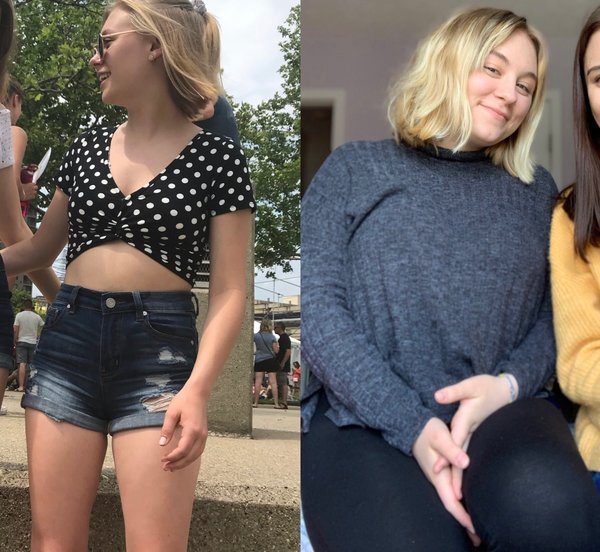Puberty is a strange thing. When I was about twelve or thirteen years old, I was going through my first telltale wave of hormones and growth. Besides the greasy skin and the growth of hair in new places, I felt as though, instead of an "ugly duckling" phase, it was a time of development; it was my budding before the bloom. There were times where I would stand in front of my mirror and mimic the poses in Roman and Grecian paintings, where women were accurately proportioned and exhibited imperfections like rolls and bumps. At first, I felt as though my journey to "womanhood" was uninhibited by pressurized standards and advertisements I saw inside my mom's beauty and fashion magazines.
But then, the stretch marks came: deep, angry-looking lightning bolts that streaked across my chest and hips. I tried different techniques to get rid of them, but they only seemed to get redder and angrier. I thought that they weren't normal, that I was some kind of marred creature tainted by an unseen curse. I felt as though my skin was made of hosiery and someone was aggravating a tear, pushing at the weakened fabric that made the runs longer and deeper. Slowly, I started paying more attention to the ads and commercials showing women with longer torsos, smaller noses, and tightly knit, rounded shoulders: things that I lacked. In middle school I hung out with girls who lined their bedroom walls with exercise routines from Seventeen, girls who didn't eat during lunch and rated each other on their cup sizes. I tried putting on fake tan lotion to put some sort of color into my skin, but I refused to go outside in case I was still too pale for it to even matter. I didn't skip meals or adopt an intense fitness regimen to make up for my average size; I simply existed, feeling inadequate.
In junior year of high school, I weighed 140 pounds. Every time I looked in the mirror, rather than mimicking paintings, I would contort and squeeze my body to try and alter it in a way that I found more aesthetically pleasing. I would cry in dressing rooms when something didn't fit, and I hungrily searched for fashion techniques that would make my waist look longer and my shoulders less broad. I was still exposed to the same harmful agenda of weight loss and "perfect" bodies, just like any other girl I knew. I wore loose and unflattering clothes like graphic tees and flare cut jeans, and only wore one-piece suits. At this point, though, the stretch marks on my body had faded into my skin, barely noticeable except for faint divets that were left behind on my chest. I also discovered that, among other things, stretch marks were completely normal for anyone and everyone to have, and that it was totally okay and natural. I also learned that the average American woman was 5'4 and weighed 140 pounds, which at the time were my exact measurements. I began to replace the media with more healthy viewpoints on body health, and over time my attitude toward my body reflected that mindset. I slowly inched away from wearing exclusively colored jeans and band t-shirts and incorporated skirts and blouses into my wardrobe. I thought that, maybe, if I made other choices with my fashion, I'd feel more comfortable with my body. I also started eating healthier, cutting soda out of my diet and incorporating salads and greens into my diet.
Then, the unthinkable happened; I started losing weight. I didn't know how or why for certain; maybe it was the diet I had adopted or the new medication I was taking, but by November of that year I weighed 125 pounds. I started wearing more risky clothes, like crop tops and shorts that hugged my body. I knew that I was stepping out of my comfort zone, but for the first time I actually felt okay with myself. Even when I started gaining the weight back, I carried that mentality with me. I wore clothes that I thought looked good on me, rather than worrying about what others think.
Now, I weigh 160 pounds. And although I still have my bad days, I know that it's better to feel healthy and present than to worry about a number on a scale. I am blessed to have supportive friends and not have to worry about eating disorders, so I know that this mentality isn't universal, but the most important part of accepting yourself is making sure that you're surrounding yourself with positive ideas and pushing away the harmful ones. And if you feel as though you need to make a change, that's completely okay too; just make sure that you're doing it with you in mind.
























